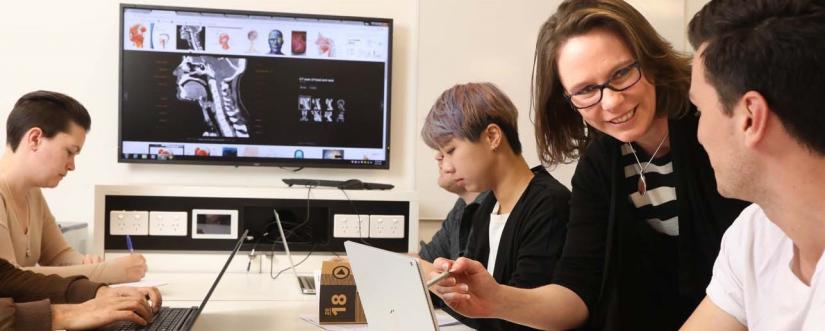Supporting health professionals to collaborate with individuals with a communication disability.
Harmony Turnbull is a speech pathologist with extensive experience in the field of disability, communication disability and swallowing disorders. Her passion sprouted during her time in high school, and has continued to grow. Today, she holds a Bachelor of Applied Science in Speech Pathology with more than 15 years of clinical experience.
We spoke to Harmony, now pursuing Higher Degree Research at the Graduate School of Health, to learn more about her work within the speech pathology field.

What were your motivations for becoming a Speech Pathologist? What pathway did you take?
When I was in high school, I explored a number of potential career options until I worked out that I wanted to work with people to improve their quality of life. I felt that speech pathology suited my interest in sciences and my abilities in collaborating with people. After finishing my Higher School Certificate, I entered a Bachelor of Science at the University of Western Sydney – which gave me an exciting introduction to life as a university student.
After a few years, I made a successful application to transfer into the undergraduate speech pathology course at the University of Sydney as a mature age student. For me, this pathway led to a very rewarding career and I love the work that I’ve been able to do.
What do you love the most about Speech Pathology?
I am passionate about supporting people with lifelong disabilities to communicate and enjoy safer meals. Many people with ongoing disabilities have support needs that require a lot of collaboration, problem-solving and creative thinking which always keeps my work interesting and rewarding.
“Many people with lifelong disabilities have support needs that involve a lot of collaboration, problem-solving and creative thinking which always keeps my work interesting and rewarding.”
More recently, I have enjoyed sharing my passion with speech pathology students. I get a huge amount of satisfaction from teaching students clinical skills in working with people with disability - using alternative communication methods with a pre-schooler who is not speaking, practicing social communication skills with a pre-teen who wants to make new friends, teaching a family to use Key Word Sign with their child who has Down Syndrome to help her understand and express herself at home, or helping an adolescent with intellectual disability to practice the speech he wants to give at his brother’s wedding.
Why the Graduate School of Health at UTS?
UTS speech pathology team has a strong focus on disability and the use of technologies in everyday practice, and we have a real opportunity here to build a course focused on inclusion of people with disability in digital health from the ground up. Working alongside staff in the Indigenous health discipline, clinical psychology, and genetic counselling only adds to my prior collaborations with other allied health professions. So The opportunity to be involved in the creation of this new course at GSH and bring my skills in disability to UTS has been exciting! The UTS model of teaching and learning lends itself perfectly to the innovations and technologies that are being embraced by the speech pathology profession.
Can you tell us about your other work prior to GSH?
I worked in the disability sector for 15 years where I provided high-level clinical services and also supported and supervised clinical staff across Western and Northern Sydney teams. In 2016 I moved into an Associate Lecturer position, including teaching and clinical education at the University of Sydney, before coming to UTS in 2018. For many years I have been a leader in actively supporting industry connections and development. In the Speech Pathology Australia ACT/NSW Branch, I have held roles in Practice, Workplace and Government portfolio, Branch President and Vice-President as well as National Conference Convener and chair of a number of project committees. In Key Word Sign NSW I am a State Trainer, responsible for the NSW Key Word Sign presenter training program.
All of these roles have given me opportunities to build a wide network of colleagues, as well as the ability to provide input at a local and national level. This has included strategic planning and the landmark ‘Speech Pathology 2030’ project, which has strongly influenced development of the speech pathology course here at UTS.
Tell us about your research interests and what you’re hoping to achieve.
I have research interests in the accessibility of communication and written information in particular, for people with disability and their supporters. This is the basis for my higher degree research. My aim is to look into the language and readability of written documents that people with communication disability receive from their health professionals. I hope to determine whether we can do better when we give people health information in more accessible or alternative formats so that they can understand it better and use it to achieve their goals. Watch this space!
What can we expect from you in the future?
Following my successful clinical career in the disability sector, I hope to now build a research and academic career that will allow me to keep in touch with all of my passions: researching what makes written information more accessible, focusing on people with lifelong disability, teaching students and providing clinical education, and supporting students to become confident and skilled speech pathologists who are ready to work with this important group.
Interested? Find out more about Speech Pathology at the Graduate School of Health.

